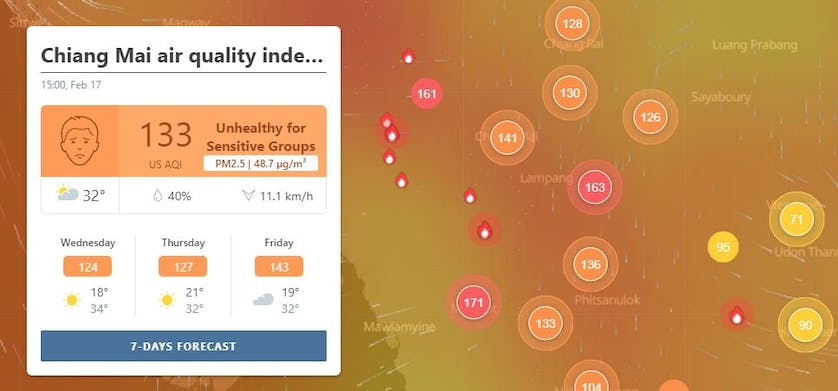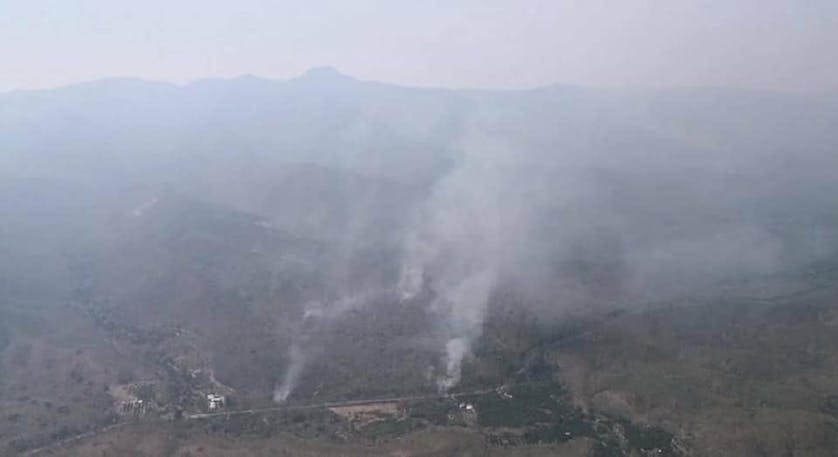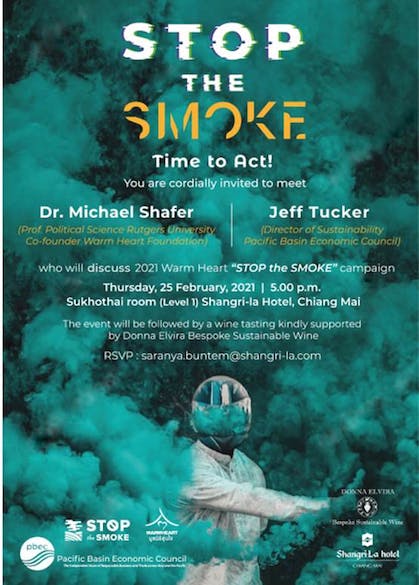The flood of emails and phone calls Citylife received following the publication of Bunnaroth’s interview came as no surprise. While there were some comments of concern by our Thai readers, the majority of messages were from expats. Comments came from far and wide and ran the gamut from advice by world experts in numerous pollution-related fields and those who have decades of on-the-ground knowledge working amongst many local communities on pollution-related issues to fathers and mothers concerned for their children’s health as well as children’s concerns for their very future. Some messages were encouraging of the council’s efforts while others were outright dismissive of them. The main theme however was that many of our expatriate readers felt great frustration that they were not being heard and that their contributions has so far been ignored.
Some of the comments received showed how disheartened many felt as one local environmentalist said, “We all know that Thailand doesn’t like advice from aliens. To me it all seems like public relations marketing talk. It has not been easy following developments due to the lack of English language reporting. Myself and a number of other foreign residents have had concerns that offers of support raised by us [have been] ignored.”
Some expressed anger and a lack of faith in the council’s ability to represent our collective interest, “These guys have claimed the space and, for what it’s worth, been anointed (almost certainly because they are correctly perceived to be toothless) and can (and do) claim to speak for the all of Chiang Mai,” said one NGO worker who has spent decades finding alternative solutions to agricultural burning.

Another Citylife reader also had this to add, “They need to look at themselves and wonder why people are questioning them. There is no point being defensive when we are all on the same team. We all want to solve this issue, so maybe egos and delicate feelings can be set aside for the collective good.”
Ben Svasti, of Blue Sky Chiang Mai, offered a more diplomatic and tempered form of constructive criticism, “It’s about communication. The universal message, all for one and one for all, must simply be ‘Stop Burning’ in the interest of our health, our environment, climate change and the future of our planet and our children. Whether we accomplish our goal in one year, five years or ten years the message must be clear: Stop Burning. We can meet up and talk about who should stop first, who should be helped to stop burning and who should be punished for arson. Each case is different, we agree, and different approaches will be required. We must look at each group who burn and ask them, why they burn, what do they need to stop burning. Maybe they need alternative cash crops or machinery or biochar incinerators or alternative livelihoods or ecofriendly crematorium. Maybe they have no good reason to burn and just burn for the sake of it, in these cases discipline may be required. But the universal message must be stop burning.”
“As soon as you go weak and wishy washy on the core communications then confusion and discord ensue,” continued Svasti. “The message cannot be that it is alright for some people to burn, otherwise government agencies, NGOs and tribal groups will all claim they have just reason to burn. One cannot draw a distinction between so called necessary and unnecessary burning, that just leads to confusion. Just keep the message clear that in this day and age, with the planet in desperate straits such dated practices as open burning must give way that to cleaner more environmentally friendly practices. We
must be realistic. We cannot stop burning in a single moment, it will take time, a gradual process of ongoing change. Marginalised farmers will need help to be freed from the tyranny of agroindustry and endless cycles of debt which give them no choice but to burn. But we must start and take a decisive step forward with the rallying call to Stop Burning.”
Michael Shafer of Warm Heart Foundation had this to add, “Because in your article the Breathe Council seemed to lack a clear vision and mission, as well as clear action plan, I would like to suggest to them that they publish – publicly, as in send to you and every media outlet in the North – a vision statement, a mission statement and an action plan for the year, that is, a set of projects that they intend to carry out…as long as the ultimate action plan may be, it should start with a short, realistic list of action items that flow directly from the organisation’s mission and that it plans to achieve in the coming year.”

Another local environmental activist echoed Shafer’s assessment, adding, “Needless to say, it is not enough simply to publish proposed actions. It is equally essential to publish clear, accurate data about the progress of each project. This data, good or bad, flattering or not, must be published because if it is not, the public will believe that the entire exercise is a fraud. If the data is fraudulent, the organisation will be forever discredited and the public will cease to believe any such data. Open access to honest data is the bedrock of democracy, which is built on public trust.”
Then there were the dozen or so emails, mainly from everyday readers who are perhaps not as involved, though just as invested, in the unravelling of this problem, most of whom were simply grateful to have heard from the horse’s mouth.
“It is so heartening to hear from Khun Bunnaroth. I don’t agree with everything he says, but it is reassuring to hear about what is going on, even if there are some flaws,” said a Canadian women who has lived in Chang Mai for 25 years.
“I have a group of dozens of friends and colleagues who want to help, who want to support,” said a young British teacher in her twenties. “Just let us help. We have so much to offer it seems silly not to let us. This is such a complex problem that I think the Breathe Council must first recognise their limitations and then simply reach out. I think that they will be surprised by the overwhelming support they may receive. I don’t know anyone who is anti-Breathe Council at this point. But if they continue to be a closed group with no public participation then the public could turn against them. And that would be a loss to us all. So, my message is let me help please.”
“Best thing I have heard in a long time,” said one 12th grade student at an international school who has been involved in environmental groups for the past couple of years. “It just feels good to have someone listen and say that they hear us. I want to tell Khun Bunnaroth that we hear him too and we are here to help him. Let’s get this done.”
One Thai reader simply sent two words for us to pass on to the Breathe Council, “Su su”.
The fight continues…together.
[Ed. Most of the comments were sent by people who have ask.ed to remain anonymous, some citing – perhaps ungrounded but still understandably – fear of retaliation by Thai authorities.]
—

The event will be held on 25th February 2021 at 5 p.m. in Sukhothai room on level 1.
